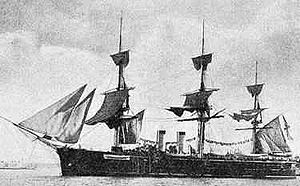Russian cruiser General-Admiral
 The Russian armored cruiser General-Admiral
| |
| History | |
|---|---|
| Name | General-Admiral |
| Namesake | Grand Duke Konstantin Nikolayevich of Russia |
| Builder | Society of Metal and Mining Works Shipyard |
| Laid down | 27 November 1870[Note 1] |
| Launched | 2 October 1873 |
| Completed | 1875 |
| Renamed |
|
| Reclassified |
|
| Fate | Scrapped 1953 |
| General characteristics | |
| Class and type | General-Admiral-class armored frigate |
| Displacement | 5,031 long tons (5,112 t) |
| Length | 285 ft 10 in (87.1 m) |
| Beam | 48 ft (14.6 m) |
| Draft | 24 ft 5 in (7.4 m) |
| Installed power | 4,772 ihp (3,558 kW) |
| Propulsion |
|
| Speed | 12 knots (22 km/h; 14 mph) |
| Range | 5,900 nmi (10,900 km; 6,800 mi) at 10 knots (19 km/h; 12 mph) |
| Complement | 482 officers and crewmen |
| Armament |
|
| Armor | |
General-Admiral was the lead ship of her class of armored cruisers built for the Imperial Russian Navy in the early 1870s. She is generally considered the first true armored cruiser.[1]
Design and description
[edit]Originally classified as an armored corvette, General-Admiral was redesignated as a semi-armored frigate on 24 March 1875. She was laid out as a central battery ironclad with the armament concentrated amidships. The iron-hulled ship was not fitted with a ram and her crew numbered approximately 482 officers and men.[2]
General-Admiral was 285 feet 10 inches (87.1 m) long overall. She had a beam of 48 feet (14.6 m) and a draft of 24 feet 5 inches (7.4 m). The ship was designed to displace 4,604 long tons (4,678 t), but displaced 5,031 long tons (5,112 t) as built, an increase of over 400 long tons (410 t).[2]
Propulsion
[edit]The ship had a vertical compound steam engine driving a single two-bladed 6.25-meter (20 ft 6 in) propeller. Steam was provided by five cylindrical boilers at a pressure of 4.24 kg/cm2 (416 kPa; 60 psi). The engine produced 4,772 indicated horsepower (3,558 kW) during sea trials which gave the ship a maximum speed around 12.3 knots (22.8 km/h; 14.2 mph). General-Admiral carried a maximum of 1,000 long tons (1,000 t) of coal which gave her an economical range of 5,900 nautical miles (10,900 km; 6,800 mi) at a speed of 10 knots (19 km/h; 12 mph). She was ship-rigged with three masts. To reduce drag while under sail her funnel was retractable and her propeller could be hoisted into the hull.[3]
See also
[edit]Notes
[edit]Footnotes
[edit]References
[edit]- Beeler, John Francis (1997). British Naval Policy in the Gladstone-Disraeli Era. San Francisco: Stanford University Press. ISBN 0-8047-2981-6.
- Campbell, N. J. M. (1979). "Russia". In Chesneau, Roger & Kolesnik, Eugene M. (eds.). Conway's All the World's Fighting Ships 1860–1905. New York: Mayflower Books. pp. 170–217. ISBN 0-8317-0302-4.
- Silverstone, Paul H. (1984). Directory of the World's Capital Ships. New York: Hippocrene Books. ISBN 0-88254-979-0.
- Watts, Anthony J. (1990). The Imperial Russian Navy. London: Arms and Armour. ISBN 0-85368-912-1.
- Wright, Christopher C. (1972). "Cruisers of the Imperial Russian Navy, Part I". Warship International. IX (1): 28–52.
External links
[edit] Media related to General-Admiral (ship, 1873) at Wikimedia Commons
Media related to General-Admiral (ship, 1873) at Wikimedia Commons
